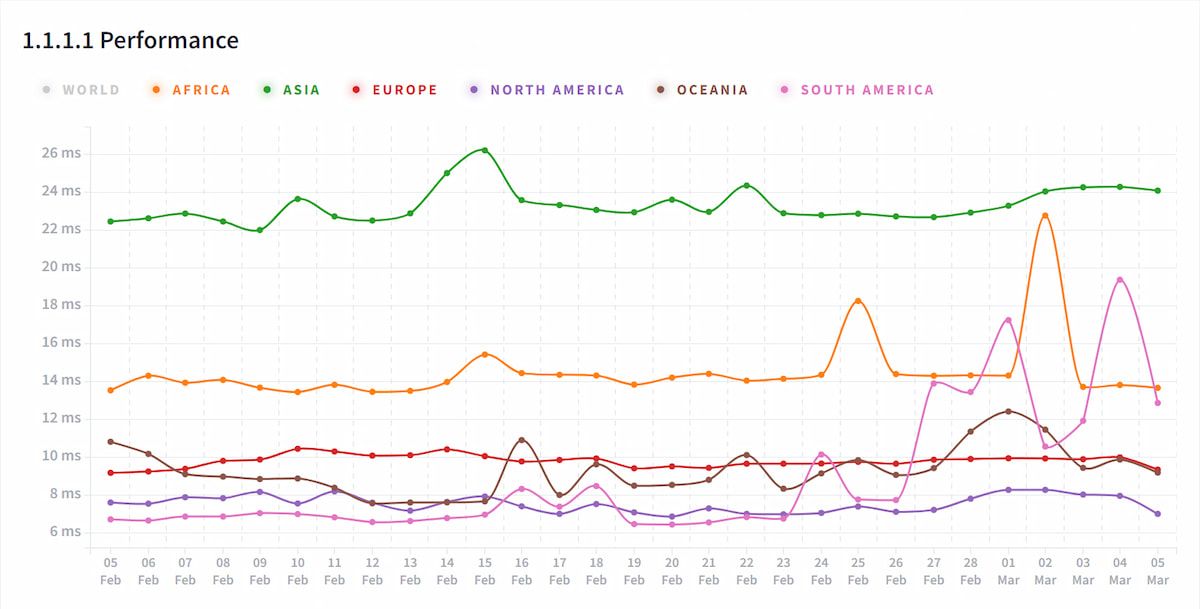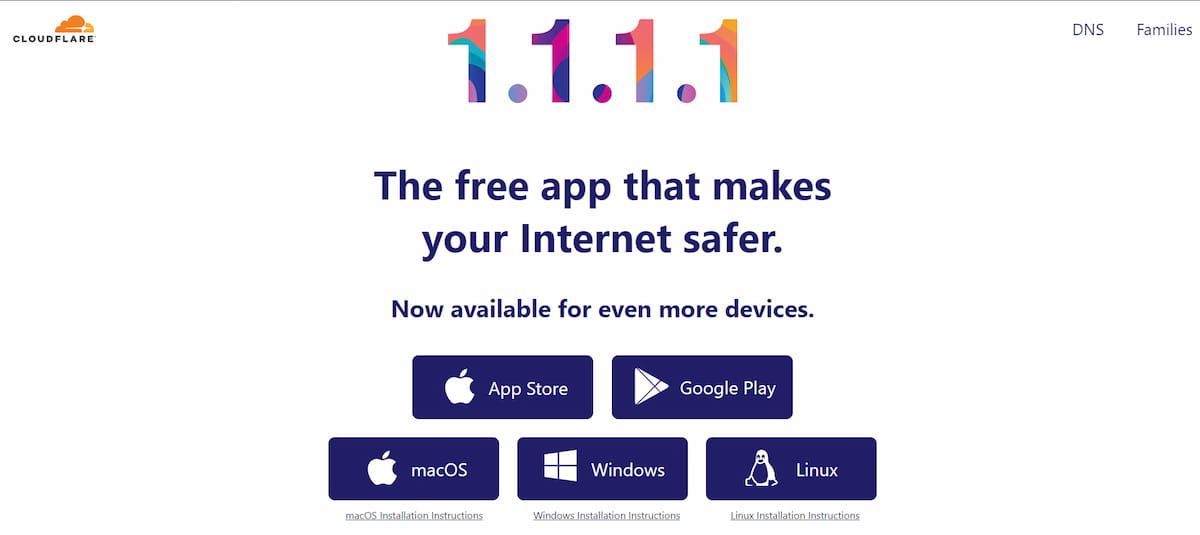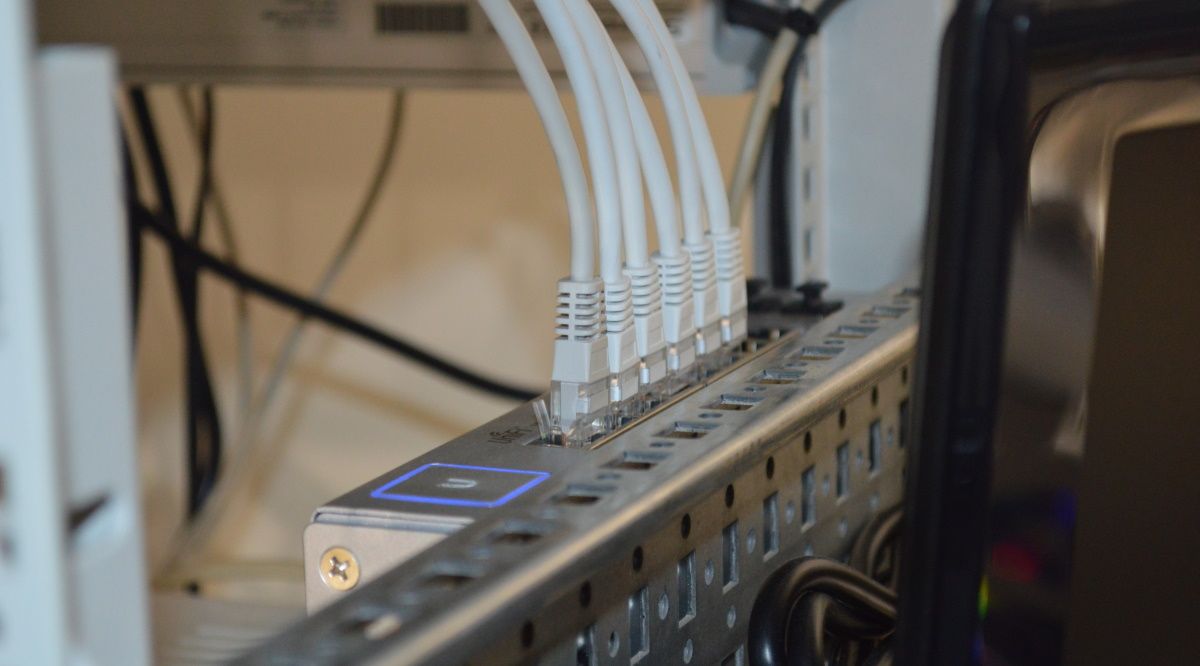Readers like you help support MUO. When you make a purchase using links on our site, we may earn an affiliate commission. Read More.
If you're a geek, you're probably familiar with DNS. A good DNS provider can significantly impact your internet connection's speed and browsing experience.
There are numerous DNS service providers, each claiming to be the fastest. And while most users stick with the default ISP option, others prefer to utilize Google DNS or Cloudflare DNS on their devices. So, let's look at which is the fastest DNS between the two and which DNS provider respects your privacy most.
What Is DNS?
The Domain Name System (DNS) is the internet's directory service. When you click a link or type a URL in your browser, your device needs to look up the website's address on the internet. Here, the DNS comes into play.
In layman's terms, a DNS is a network protocol that connects you to websites by connecting human-readable domain names (for example, www.makeuseof.com) with the server's unique identifier address.
That's a rough overview, but if you want to know more about DNS, you should check out our primer on what DNS is and why it's important.
Google DNS vs. Cloudflare DNS
It is a fact that whatever websites or links you visit in your browser, your Internet Service Provider (ISP) keeps track of all that. In some cases, they can even sell that information to advertisers. This is why using a private DNS has become so important.
Fortunately, both Google public DNS (8.8.8.8) and Cloudflare DNS (1.1.1.1) offer reliable latency and DNS optimizations to a global audience.
Both DNS providers are popular options worldwide, although you should check out our list of DNS providers that focus on online safety if you're a bit more vigilant. However, when choosing the best DNS service providers, Cloudflare's 1.1.1.1 DNS outperforms the Google DNS servers in several key categories.

Let's see how these two well-known DNS providers fare in a head-to-head comparison of significant factors.
1. Basic Features
In a Cloudflare DNS vs. Google DNS comparison, the former is mainly preferred for its easy-to-use protocols and privacy-focused measures. On the other hand, Google DNS is preferred by many because it is backed by Google, which means it is safe and easy to use.
However, it is not hidden from anyone that Google is not the best option if you care about your privacy. Another downside is that if you use Google's public DNS, you don't get a DNS filtering feature.
DNS filtering is a solution for preventing spam emails from being sent from known malicious IP addresses. Cloudflare, thankfully, supports DNS filtering in addition to browser isolation and other features that ensure the security of internal users.
Another good thing about Cloudflare is that its DNS service is also available for Tor clients, which is like a cherry on the cake. The Tor network and Tor browser provide much greater anonymity online, ensuring greater privacy while browsing the internet.
Another reason to choose Cloudflare is that it offers dedicated apps and software to download from 1.1.1.1 and set up extra settings for Android, iOS, Windows, or even a Mac.
2. Privacy and Security

As with smart devices, DNS is prone to various online attacks that redirect users to malicious websites. As a result, it is imperative to choose DNS providers that will protect your family from malicious attacks.
- To protect your privacy, Cloudflare's DNS replaces your ISP's DNS and encrypts every request your device sends so no one else can read it.
- Besides that, both Google DNS and Cloudflare DNS support DNS-over-HTTPS, DNS-over-TLS, DNSSEC, and DoS attack protection. In layman's terms, both providers ensure a secure internet experience. The one caveat worth mentioning is that Google is an advertising company, and its most valuable asset is its users' data.
Google retains query IP address data for 24 to 48 hours for performance and security reasons, but internet service provider (ISP) and location information are permanently kept on Google's servers.
On the other side, Cloudflare keeps only a small amount of transaction and debug log data for 25 hours to do legitimate research. So, if you're a privacy-concerned user, the best alternative is Cloudflare's 1.1.1.1 DNS.
3. Speed and Performance
In terms of speed, Cloudflare Public DNS outperforms Google DNS. This is because of several things, including global coverage, more servers, and network optimization. At times, DNS lookups create a bottleneck, slowing down your browsing. Thankfully, Cloudflare has taken several steps to improve DNS lookup times.

That is not to say Google's DNS is not fast or performs poorly. Google's DNS servers are housed in data centers worldwide, and users are sent to the data center closest to them.
Although rare, it's possible that some websites take more than a minute to load or won't load properly at all with Cloudflare DNS. This is because Cloudflare optimizes the connection when you connect to its DNS, which sometimes does more harm than good. To solve it, you need to change the DNS provider.
You can generally use Google DNS to avoid pressure on your ISP's DNS servers. It can serve many users without asking other DNS resolvers for help using its global data center and cache infrastructure.
Besides that, it uses large, Google-scale caches and balances your internet traffic so that it can respond to a large number of queries from the cache.
4. Global Connectivity and Latency

When it comes to global connectivity and coverage, Cloudflare has servers in over 250 cities worldwide, while Google has servers in more than 175 locations. But does the large number of servers even matter to you? Well, yes; the more servers a DNS provider has, the faster the speeds for a large population and the lower the latency.
Latency means the delay between your action on the internet and the response you're getting after that action. For example, if you search for something on Google and the results appear late, it means the latency (or delay) is too much. This could be because the DNS server you're connected to is far from your current location.
Latency depends on geographical areas. If you're located in a region with many data centers, the latency will be much lower than in areas with fewer. We recommend checking out DnsPerf's DNS performance page to get a clear overview of the best DNS for you. Don't forget to change the Location to your country for better and more accurate results.

If you're experiencing slow internet browsing speeds with a custom DNS server, consider switching to the closest DNS server.
To summarize the 1.1.1.1 vs. 8.8.8.8 comparison regarding connectivity and latency, it depends on your location to know which one you should go with. If you live in an area where Google's public DNS servers are in large numbers, it's clear that Google will be the fastest DNS to go with.
5. Reliability and Uptime
Both Cloudflare and Google use anycast routing to improve DNS reliability. This means that when you visit a website, the DNS connects you to a nearby server and routes your IP address to that server. It ensures that you have a smooth web browsing experience.
Another important aspect to check while switching to a DNS provider is its uptime. To simplify, DNS uptime shows how active a DNS server is. When it comes to uptime, there's not much difference between Cloudflare and Google.
Both service providers ensure the best uptime globally. However, DNSPerf's DNS comparison shows Cloudflare consistently ranking among the top 10 fastest DNS providers with more than 99% uptime.
To summarize it for you, if you're looking for a quality DNS service provider that respects your privacy, Cloudflare is a better option due to its excellent uptime history.
Google vs. Cloudflare DNS: Which One Should You Choose?
In the Cloudflare vs. Google DNS comparison, both are leading DNS service providers with many valuable features.
If you value your privacy and want to keep one step ahead of the competition, Cloudflare DNS (1.1.1.1) is, in our view, the best option. On the other hand, if you're facing issues with internet speed and connectivity after connecting to Cloudflare—you might prefer using Google public DNS (8.8.8.8/8.8.4.4).
However, before deciding, you should perform some benchmarking to determine the best DNS for you, as other aspects, such as location and availability, play a significant role.